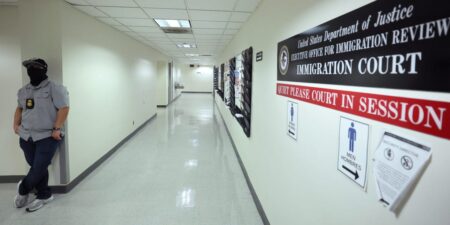Business leaders have long embraced the adage: “There’s no such thing as bad publicity.”
Not anymore.
Company leaders are becoming increasingly tight-lipped in the wake of the Trump administration’s fresh attacks on philanthropist George Soros, LinkedIn co-founder Reid Hoffman, and comedian Jimmy Kimmel, several public-relations pros told Business Insider.
They said CEOs are declining press and other speaking opportunities, even on seemingly benign topics, for fear of irking the White House and beyond. The PR pros added that company leaders are also being extra cautious about what they write online and in internal communications.
In recent weeks, two CEO clients of Marin Richardson, CEO of Disrupt PR in Austin, turned down offers to do interviews with major media outlets. She said one of the opportunities was on a somewhat politically sensitive topic, and the other wasn’t controversial at all. She added that one of the clients is pursuing federal contracts, while the other works with lobbyists.
“They’re afraid of getting flagged or on a list that would imply they shouldn’t be engaged by the government,” Richardson said. “It’s just such a polarizing climate.”
Similarly, CEO clients have lately been telling Lydia Davey, cofounder of Attentio PR in San Francisco, that they’re worried a speaking-engagement mishap will derail their careers.
“I am seeing an unwillingness right now to have a point of view on almost anything,” she said. For example, the CEO of a hospitality company recently passed up an opportunity to discuss the state of the tourism industry with a major business publication. “They’re just not willing to risk it,” Davey said.
Under pressure
Choosing silence is understandable, leadership and communications experts told Business Insider, given the pressure that several of President Donald Trump’s critics are now under.
Trump recently singled out Soros and Hoffman as Democratic donors who may need investigating. Disney and Sinclair temporarily pulled Kimmel’s late-night show over remarks the comedian made about the killing of Trump ally and conservative activist Charlie Kirk.
The White House isn’t all that’s had a chilling effect on leaders. As social issues have become even more divisive in recent years, executives have also shied away from discussing anything that could antagonize customers, investors, employees, or activists.
“Organizations and their leaders are aware, in this moment, of how vulnerable they are to the winds of political change,” Don A. Moore, a professor at the University of California-Berkeley’s Haas School of Business who researches confidence, told Business Insider. “That awareness ought, sensibly, make them more reluctant to take public stances.”
White House spokeswoman Abigail Jackson told Business Insider that it is “the ultimate hypocrisy to accuse President Trump of what Joe Biden actively did throughout his presidency: engaging in lawfare against his political opponents.”
Avoiding the hornet’s nest
Vice President JD Vance’s recent urging of Americans to report people who praise Kirk’s death to their employers has also added to company leaders’ anxiety as of late, leadership experts told Business Insider. Several companies have since fired or disciplined workers for comments they made about Kirk on social media, including Microsoft, Delta Air Lines, and Nasdaq.
“Whether you agree or disagree with Vance, he is pressuring CEOs” to take a stand on the matter, said Laura Greve, a psychologist in Boston for C-suite executives, politicians, and other high achievers.
Further driving leaders to keep mum is the painful reality that just about anything they say publicly could be taken out of context in the form of a short video clip or written pull-quote, and then go viral online.
“All of a sudden, things are going to be attributed to you that you didn’t mean,” said Ronald J. Placone, a communications professor at Carnegie Mellon University’s Tepper School of Business in Pittsburgh.
There’s also the potential for a live, public conversation between a CEO and another person — be that a journalist, another CEO, or audience members — to go politically sideways.
“You don’t want to be baited into getting there,” said Placone. “You don’t want to be caught up in that hornet’s nest.”
CEOs who make politically charged comments by accident or intentionally could land themselves in hot water with more than just the Trump administration. If their contract or company policy prohibits certain language, their jobs could end up on the line, especially if the remarks end up hurting the business financially, warned Andrew B. Zelman, an employment attorney in Fort Lauderdale.
Gary Rich, founder of leadership-coaching firm Rich Leadership in New York, said it’s fine for CEOs to talk publicly about their businesses or the industry they’re in. He just recommends they avoid wading into politics, no matter who’s in the White House.
“Stay in your lane running the business,” he said. “When CEOs step into areas where they are not experts, they almost always create problems for themselves.”
Read the full article here
















